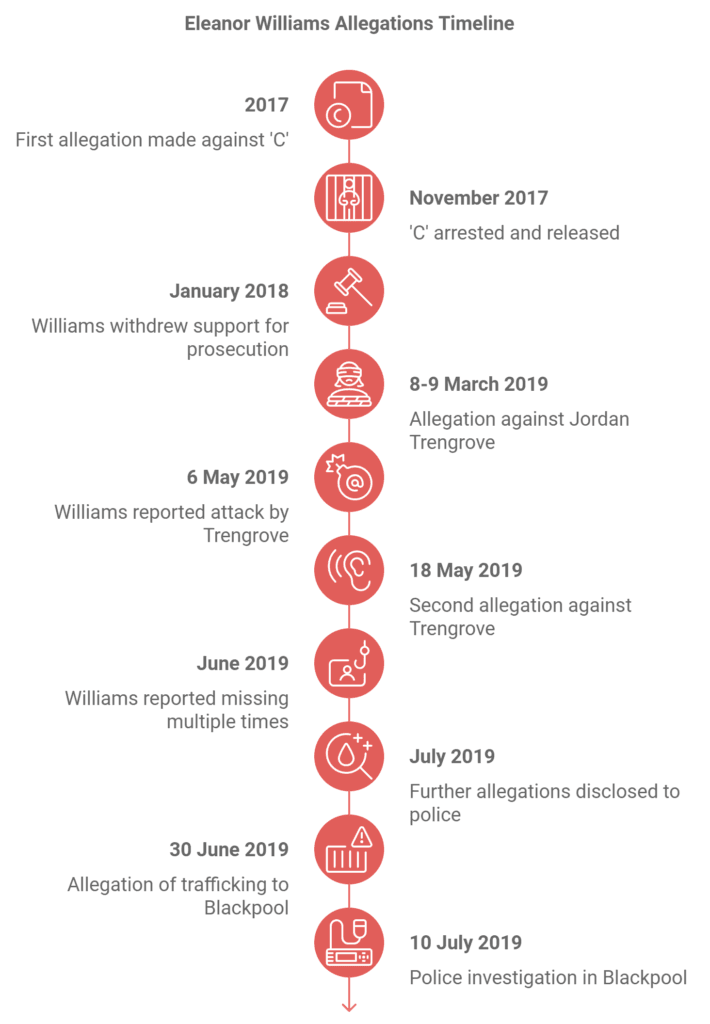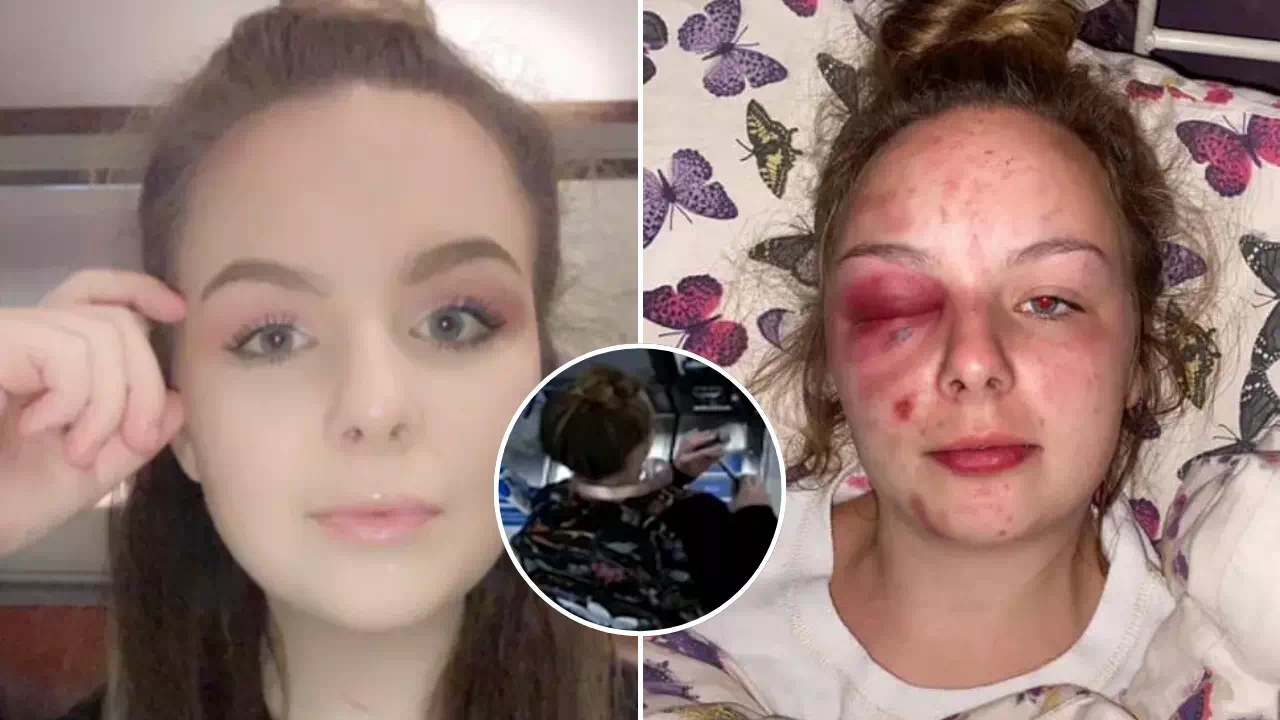A 22-year-old woman from Barrow, UK, whose fabricated claims of rape and trafficking spurred national outrage, was sentenced to 8.5 years in prison for perverting the course of justice.
Eleanor Williams, who falsely accused multiple men of trafficking and rape, was found guilty after a complex 10-week trial in 2022.
Her lies not only tore lives apart but also fueled racial tensions and strained police resources.
The Scandal
The investigation into Williams’ claims began in May 2020, when her family reported her missing once again. By then, she had been reported missing over 30 times in the preceding year.
When officers found her standing alone in a field, disoriented, covered in blood, and with significant injuries, she claimed she had been abducted by a group of 10 Asian men, brutally raped, and beaten. The injuries were some of the worst police had seen in their investigation, and she was quickly taken to the hospital.

The day after her return, Williams posted photos of her injuries on Facebook. The post quickly went viral, causing public anger and rumors about a local sex trafficking ring targeting young women.
The Community
Williams’ allegations sent shockwaves through the town of Barrow and beyond. The story spread like wildfire, thanks in part to social media. Her post was viewed over 100,000 times, and within days, people across the UK were calling for justice for Williams and the other “60 girls” she claimed were victims of the same trafficking ring.
As racial tensions grew, Barrow’s South Asian community found itself under siege. faced threats, vandalism, and hate crimes.
Cumbria Police later revealed that over 150 incidents were reported following Williams’ Facebook post, 83 of which were classified as hate crimes.

Among those accused was local businessman Mohammed Ramzan, who Williams alleged had been one of her main traffickers. Ramzan described his life after the false accusations as a living nightmare. “I had ‘rapist’ spray-painted on my house, my windows smashed,” he said in court. “I didn’t leave my house for months.”
Another of Williams’ targets was Jordan Treno, who was charged with three counts of rape. Treno spent 10 weeks in a sex offender wing awaiting trial, enduring what he called a “disgusting” experience. “To be there when you know you haven’t done anything wrong is 100 times worse,” he said.
The stigma followed him even after his release, forcing him to leave Barrow. “No matter where I went, someone would always know,” he said, recalling the damage to his reputation
The Truth
As police dug deeper into Williams’ story, problems started to appear. Investigators retrieved her Snapchat data, which gave clear evidence of the lies she had made up.

Linguistic analysis revealed that Williams had created messages from fake accounts, which she then attributed to her so-called traffickers.
She even went so far as to write letters to herself, pretending they were from Mohammed Ramzan.
One of her most significant lies involved changing the contact name of an old school friend, Harry Cooper, in her phone to “ex Haram” and later “ex Ramy” to make it appear as if her traffickers were contacting her.
She also created multiple fake identities, including one she named “Rolo Kelsey,” another alleged trafficker who didn’t exist.

When police found a hammer covered in blood at the field where Williams was discovered, DNA testing revealed only her own DNA on the weapon. CCTV footage captured her purchasing the hammer, and a pathologist determined that her injuries were self-inflicted.
Despite the mounting evidence, Williams continued to deny inflicting the injuries on herself, telling the court, “I’m not a psychopath.”
The Aftermath
As the trial came to a close, it took the jury just three and a half hours to find Williams guilty of eight counts of perverting the course of justice.
Her sentencing, which was unusually televised, marked the end of an investigation that had consumed years of police work and devastated the lives of innocent men.
The prosecution’s case relied heavily on forensic evidence, phone data, and expert testimony, including forensic psychiatrist Dr. Lucy Bacon, who diagnosed Williams with complex post-traumatic stress disorder (C-PTSD) stemming from childhood trauma. Williams, however, continued to deny the extent of her deception, admitting only that she had “done wrong on some of this.”
The ripple effects of Williams’ lies were profound. Not only were the falsely accused men’s lives irrevocably damaged, but the police investigation, which spanned several years, also diverted resources from real victims in need of help. Ramzan, Treno, and others who had been wrongfully accused faced relentless public scrutiny, threats, and the destruction of their reputations. Treno, in particular, struggled to rebuild his life after being forced to leave his hometown.
Cumbria Police confirmed that over 60,000 man-hours were dedicated to investigating Williams’ claims. “We weren’t just fighting for Eleanor, we were fighting for the 60 girls she claimed were being affected by this,” said Detective Doug Marshall, the senior investigating officer on the case.
Legal
The case sparked nationwide debates on how to handle false accusations and social media’s role in spreading misinformation.
The Online Safety Act 2023, referenced Eleanor Williams’ case, giving new powers to regulate online speech deemed harmful. The act allows the government to designate, suppress, or record content that could incite hate or violence, reflecting the damage done by Williams’ viral post.
Additionally, calls were made for tighter regulations on crowdfunding campaigns after more than £20,000 was raised to support Williams’ case. After public outrage, it was revealed that only £13,000 had been donated to homeless charities, with the rest returned after legal action was taken.
For the families of the men Williams accused, justice has come with bittersweet relief. As Ramzan reflected, “The damage has been done. No sentence can undo what she did to us.”
Williams will be eligible for parole in 2027. While her sentence may have concluded her legal battle, the scars she left on her community—and the men she wrongfully accused—will remain far longer.

